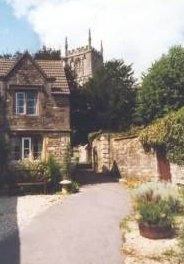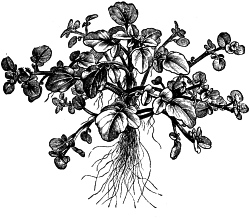Notes about Notes from the Edge (of the Forest of Dean)
By Charlie Burling
 First of all, a geography lesson. I live quite near the Forest of Dean, but the river Severn is in the way and requires either a forty mile detour via Gloucester or a drive over one of the bridges via Wales. Wales is quicker, but the bridges have tolls. The funny thing about this route to Wales is that you pay to get in, but it's free to get out. I live in Wotton-Under-Edge, this Edge being the edge of the Cotswold escarpment.
First of all, a geography lesson. I live quite near the Forest of Dean, but the river Severn is in the way and requires either a forty mile detour via Gloucester or a drive over one of the bridges via Wales. Wales is quicker, but the bridges have tolls. The funny thing about this route to Wales is that you pay to get in, but it's free to get out. I live in Wotton-Under-Edge, this Edge being the edge of the Cotswold escarpment.
Now, the geology. The Cotswolds are made of limestone and are very good for grazing sheep on the hilly bits and cows on the flatter bits. Most of the districts' wealth came from the wool trade. My part of the world is beneath the limestone on the alluvial plain of the Severn, the longest river in England. The plain stretches for miles and miles and is extremely good for growing vegetables, fruit and cereals and raising livestock.
Next, the history. Wotton was first mentioned in AD 940. The area is closely associated with the Berkeleys, one of  England's oldest families. In 1641, William Berkeley became Governor of Virginia, so there is an American connection. Berkeley castle was originally built to keep out the Welsh, who had learned to swim. It is famous for being the place where Edward II met an extremely gruesome end. Edward II was a spectacularly useless king, and managed to lose the Battle of Bannockburn to the Scots. The Berkeley's married well, usually stayed on the right side of whoever was in power, and ended up owning a lot of land and England's last private army. Being nobility, they liked their hunting, so they raised lots of deer and pheasants and still do to this day.
England's oldest families. In 1641, William Berkeley became Governor of Virginia, so there is an American connection. Berkeley castle was originally built to keep out the Welsh, who had learned to swim. It is famous for being the place where Edward II met an extremely gruesome end. Edward II was a spectacularly useless king, and managed to lose the Battle of Bannockburn to the Scots. The Berkeley's married well, usually stayed on the right side of whoever was in power, and ended up owning a lot of land and England's last private army. Being nobility, they liked their hunting, so they raised lots of deer and pheasants and still do to this day.
And now the culinary...
Given all the above, you couldn't want a better place for the sheer quality and variety of local food. If you know where to shop, it is a foodies paradise.
I've lived around here for ten years now. Firstly in Stroud, a former mill town that has a (thoroughly deserved) reputation for attracting people who lead “Alternative” lifestyles. There are times when it resembles a psychiatric ward with a farmers market.
I now live in Wotton (we tend to ignore the Under-Edge bit). It is a most delightful small English town. We have some very old buildings, but nothing exceptional. Apart from the odd hiker, the tourists tend to leave us alone. I love it here.
There are a reasonable selection of shops, banks, pubs and cafés in the town, but to get the best of local food, you have to get into the car.
 I've gotten to know the lanes and minor roads well over the years. I know where all the fruit trees that overhang public roads are. Also in the public domain, there are copious supplies of wild garlic, horseradish, salad plants and hazelnuts. My latest find is a chestnut tree, which will be visited next autumn.
I've gotten to know the lanes and minor roads well over the years. I know where all the fruit trees that overhang public roads are. Also in the public domain, there are copious supplies of wild garlic, horseradish, salad plants and hazelnuts. My latest find is a chestnut tree, which will be visited next autumn.
People put out little stalls with home-grown produce – vegetables, fruit, eggs, preserves and chutneys. They have an “honesty box” and trust you to pay the right money. It is never expensive. I regularly drive past one that sells trays of vegetable plant seedlings. This year I will buy some and grow a few vegetables of my own. There are also many farms that will sell direct to the public and various pick-your-own operations.
Take out a fishing licence and there is everything from crayfish and trout in the ponds and streams to wild salmon in the Severn. The Severn even has elvers (you have to have a special licence) and the, very rare, freshwater lamprey (illegal to catch as it is a protected species). I'm not a fisherman, but I have been known to buy someone's catch (but have yet to find someone who'd sell me a lamprey).

There are enough people with guns to ensure a constant supply of rabbits, pheasants, duck, partridge and wood pigeon. These are cheap and plentiful when in season. The local farm shop sells them in oven-ready form. I tend to eat a lot of game these days. They also sell the current Lord Berkeley's venison, but only to people with more money than I've got. Perhaps britishfoodinamerica would like to sponsor a series of venison recipes.
There are lots of local manufacturers adding value to the produce. Cheese, bacon, beer. We like our food in Gloucestershire.
Finally, the biographical...
I retired early and therefore have a lot of time on my hands. I spend a lot of it driving down country lanes, visiting the little towns and generally sourcing ingredients for dinner. I regard dinner as therapy. It is the best anti-depressant ever invented.
This does not mean that I am averse to shopping in supermarkets. I visit them all, mooching around and searching out bargains like a truffle-hound. I live on a very limited budget, but have extremely expensive tastes. This means that I have become pretty adept at using cheaper cuts of meat and anything I can get for free.
Notes From The Edge is a series of articles about how I find stuff for my dinner and people, produce and places I encounter on the way. You will not find many fancy recipes. Basically I either roast, fry, stew, steam, boil or bake things. I do not own a deep-fat fryer or a microwave oven.
I hope that this puts my ramblings into some sort of context and that you enjoy reading them. I'm always up for a bit of feedback and you can reach me at burlingcharlie@googlemail.com or by punching the FeedbaG button at the bottom of the bfia homepage.

